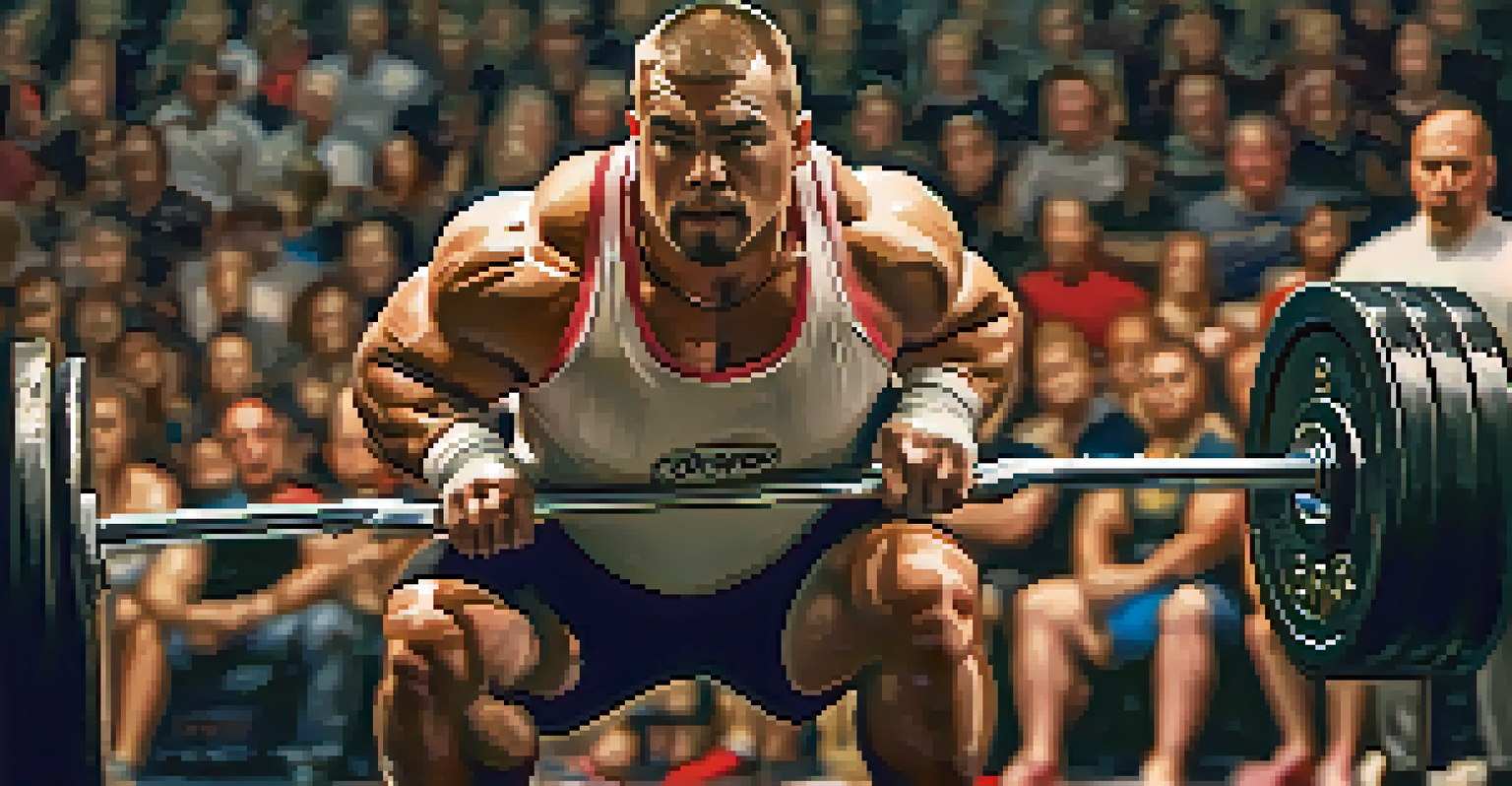Powerlifting as a Tool for Personal Growth and Goals

Understanding Powerlifting and Its Core Principles
Powerlifting is more than just lifting heavy weights; it’s a sport that focuses on three primary lifts: the squat, bench press, and deadlift. These movements are designed to test an individual’s maximum strength, but they also serve as a foundation for personal growth. By mastering these lifts, athletes learn discipline, dedication, and resilience—qualities that extend beyond the gym.
Success is not final, failure is not fatal: It is the courage to continue that counts.
At its core, powerlifting emphasizes technique, making it essential for lifters to understand their bodies and movements. This focus on form not only reduces the risk of injury but also builds a deeper connection between the lifter and the weights. As individuals strive to improve their lifts, they often find themselves developing a more profound understanding of their physical capabilities.
Moreover, powerlifting encourages a mindset of continuous improvement. Lifting heavier weights over time requires setting and achieving specific goals, which can boost confidence and motivation. This journey of self-discovery through powerlifting can be incredibly rewarding, as athletes learn that progress is a gradual process.
Setting Personal Goals Through Powerlifting
One of the most significant aspects of powerlifting is the opportunity to set personal goals. Whether it's lifting a certain weight or mastering a specific technique, these goals provide direction and purpose. By establishing these targets, lifters create a roadmap for their training, which can lead to a greater sense of achievement when milestones are reached.

For many, the journey of setting and achieving goals in powerlifting also translates into other areas of life. The skills gained from this process—such as planning, commitment, and time management—are invaluable. As lifters experience success in the gym, they often find the confidence to tackle challenges in their personal and professional lives.
Powerlifting Cultivates Resilience
Overcoming physical challenges in powerlifting fosters mental fortitude that translates into greater resilience in everyday life.
Additionally, the goal-setting aspect of powerlifting encourages a growth mindset. Athletes learn to embrace setbacks as opportunities for learning rather than failures. This shift in perspective can lead to increased resilience, allowing individuals to approach challenges with a positive attitude.
Building Resilience Through Physical Challenges
Powerlifting inherently involves overcoming physical challenges, which can significantly contribute to personal resilience. Each lifting session presents an opportunity to confront discomfort and push through barriers. This process of facing challenges head-on fosters mental fortitude, making it easier to navigate life's hurdles outside the gym.
What lies behind us and what lies before us are tiny matters compared to what lies within us.
As lifters progress, they often encounter plateaus—periods where progress seems to stall. These plateaus can be frustrating, but they also teach valuable lessons in perseverance. Learning to push through these tough times cultivates a mindset that embraces challenges rather than shying away from them.
Moreover, the support from the powerlifting community can be a crucial factor in building resilience. Training with others who share similar goals creates a network of encouragement and motivation. This camaraderie helps individuals stay committed during tough times, reinforcing the idea that they are not alone in their journey.
Enhancing Self-Discipline and Time Management Skills
Engaging in powerlifting requires a significant commitment to training, nutrition, and rest. This commitment naturally enhances self-discipline, as lifters must consistently show up for their workouts and adhere to their training plans. Over time, this discipline can spill over into other areas of life, creating a more structured and balanced lifestyle.
Time management becomes a crucial skill as lifters juggle their training schedules with work, family, and other responsibilities. Organizing training sessions around daily life fosters a sense of responsibility and prioritization. This ability to manage time effectively can lead to increased productivity and a greater sense of control in various aspects of life.
Goal Setting Fuels Personal Growth
Establishing personal goals in powerlifting promotes a sense of achievement and develops skills like commitment and time management.
Additionally, the discipline developed through powerlifting can lead to healthier lifestyle choices. As athletes become more aware of the importance of nutrition and recovery, they often find themselves making better decisions outside the gym. This holistic approach to self-care contributes to overall well-being and personal growth.
The Role of Community in Personal Development
The powerlifting community is known for its supportive and inclusive nature, which plays a vital role in personal growth. Being part of a group that shares similar goals creates a sense of belonging and encouragement. This camaraderie can motivate individuals to push their limits and strive for greater achievements.
Training with others allows lifters to share experiences, tips, and feedback, fostering an environment of collective improvement. The bonds formed within the community often translate into friendships that extend beyond the gym, providing a support network that can be beneficial in times of need.
Moreover, participating in competitions can enhance personal growth by encouraging individuals to step out of their comfort zones. The experience of competing not only boosts confidence but also teaches valuable lessons in sportsmanship, humility, and perseverance. These qualities can enhance relationships and interactions in everyday life.
Embracing Failure and Learning from Setbacks
In powerlifting, failure is a common occurrence—whether it’s missing a lift during training or competition. Learning to embrace these failures as part of the journey is crucial for personal growth. Each setback provides an opportunity for reflection and adjustment, helping athletes to identify areas for improvement.
This mindset shift can profoundly impact how individuals approach challenges outside the gym. Instead of fearing failure, they learn to view it as a stepping stone toward success. This resilience in the face of adversity can lead to increased confidence in tackling other life challenges.
Community Supports Individual Success
Being part of the powerlifting community provides encouragement and shared experiences that enhance personal development.
Additionally, sharing experiences of failure with fellow lifters helps normalize these struggles. This collective understanding reinforces the idea that setbacks are a natural part of any journey, creating a supportive environment where individuals feel empowered to keep pushing forward.
Transforming Mindset: From Limitations to Possibilities
Powerlifting has the power to transform an individual's mindset, shifting focus from limitations to possibilities. As lifters break personal records and achieve goals, they begin to see their potential in a new light. This transformation can lead to a more positive outlook on life, enabling individuals to conquer challenges they once deemed impossible.
The process of training for powerlifting encourages self-reflection and mindfulness. Lifters learn to listen to their bodies and acknowledge their mental barriers, fostering a deeper understanding of their capabilities. This awareness can translate into increased self-acceptance and a more compassionate relationship with oneself.

Ultimately, the journey of powerlifting teaches that growth often lies just outside one’s comfort zone. By continuously challenging themselves and embracing new experiences, individuals can unlock their true potential—both in the gym and in life.